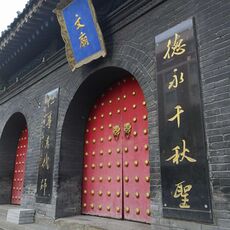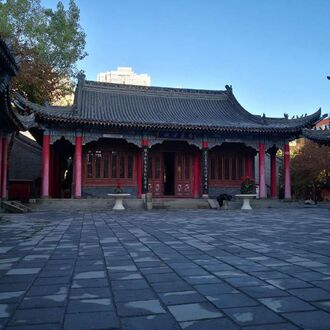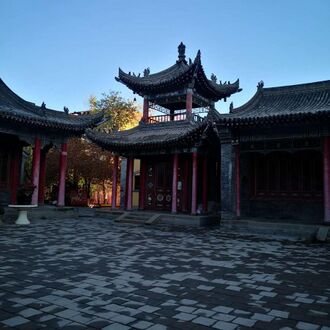Religion:Urumqi Confucius Temple
| Urumqi Confucius Temple | |
|---|---|
乌鲁木齐文庙 | |
 | |
| Religion | |
| Affiliation | Confucianism |
| Location | |
| Location | No. 15, north side of Qianjin Road, Tianshan, Urumqi, Xinjiang |
| Architecture | |
| Date established | Late Qing Dynasty |
| Expression error: Unexpected < operator. | |
Urumqi Confucius Temple (simplified Chinese: 乌鲁木齐文庙; traditional Chinese: 烏魯木齊文廟), or Urumqi Confucian Temple,[1] is a Confucian temple located at No. 15, north side of Qianjin Road (前进路),[2] Tianshan District, Urumqi City, Xinjiang Uygur Autonomous Region.
Built in the late Qing Dynasty, [3] Urumqi Confucius Temple is the only well-preserved Qing Dynasty style temple complex in Xinjiang,[4] and is the only remaining Confucian temple in Xinjiang.
History
Urumqi Confucius Temple was built on Culture Road (previously Confucius Temple Lane) in 1765-1767,[5] when the Qing Government expanded the Dihua New City (迪化新城, now Urumqi City).[6]
Originally known as the God Temple (上帝庙),[7] Urumqi Confucius Temple was rebuilt in the Eleventh year of the Republic of China (1922),[8] dedicated mainly to God and secondarily to Confucius.[9] In 1945, the main hall of the God Temple was rebuilt as the Confucius Dacheng Hall (孔子大成殿).[10]
Conservations
In 1979, Urumqi Confucius Temple was listed as a municipal-level cultural relic protection unit in Urumqi.[11]
In October 2019, Urumqi Confucius Temple was included as the eighth batch of the China's Major Historical and Cultural Site Protected at the National Level.[12]
References
- ↑ Chahryar Adle (1 January 2005). History of Civilizations of Central Asia: Towards the contemporary period : from the mid-nineteenth to the end of the twentieth century. UNESCO. pp. 705–. ISBN 978-92-3-103985-0. https://books.google.com/books?id=XPfcfF8LRWQC&pg=PA705.
- ↑ Xinjiang Portraits. Xinjiang Fine Arts Photography Press. 1995. ISBN 978-7-80547-316-1. https://books.google.com/books?id=VBE3AQAAIAAJ.
- ↑ Prices Monthly. Editorial Department of Prices Monthly. 2003. pp. 341–. https://books.google.com/books?id=JVazAAAAIAAJ.
- ↑ "Urumqi Confucius Temple". China National Knowledge Infrastructure. 2012-02-05. http://www.cnki.com.cn/article/cjfdtotal-xjba201202005.htm.
- ↑ "Urumqi Confucius Temple (Photo)". Sina. Oct 16, 2008. http://travel.sina.com.cn/china/p/2008-10-16/113030524.shtml.
- ↑ "The only well-preserved Qing Dynasty temple complex in Xinjiang: Urumqi Confucius Temple". QQ.com. 2012-02-05. https://rufodao.qq.com/a/20140703/019743.htm.
- ↑ Zhao Yongfen; Zhao Yuzhi (1999). China Museum Travel Guide. China Tourism Publishing House. pp. 328–. ISBN 978-7-5032-1631-2. https://books.google.com/books?id=7N7nAAAAIAAJ.
- ↑ Xinjiang Arts. Xinjiang People's Publishing House. 1995. pp. 33–. https://books.google.com/books?id=MLsrAAAAMAAJ.
- ↑ Xinjiang Yearbook. Xinjiang People's Publishing House. 1991. pp. 390–. https://books.google.com/books?id=j_87AAAAMAAJ.
- ↑ Chinese Museum History. Huaxia Publishing House. 1995. pp. 1027–. ISBN 978-7-5080-0664-2. https://books.google.com/books?id=fazmAAAAIAAJ.
- ↑ Sun Jinji; Feng Yongqian; Su Tianjun; The Editorial Committee of the Integrated Chinese Archaeology. Integrated Chinese Archaeology. Beijing Publishing House. pp. 884–. https://books.google.com/books?id=kIMLAQAAMAAJ.
- ↑ "Several cultural relics in Xinjiang were listed as the eighth batch of national key cultural relics protection units". China Central Television. Oct 17, 2019. http://news.cctv.com/2019/10/17/ARTI3rPQjzIgTVmOhWbyevtS191017.shtml.



